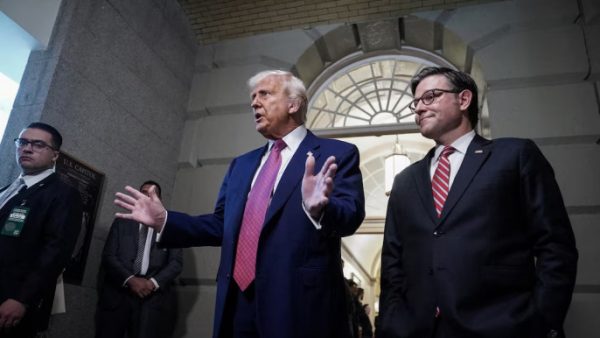The House launched debate before midnight and by dawn the vote was called, 215-214, with Democrats staunchly opposed. It next goes to the Senate.
Republicans made one last round of revisions before the bill reached the House floor, boosting the state and local tax deduction to win over centrists and speeding up the work requirements in Medicaid to win over those who didn’t believe the bill did enough to curb spending.
“To put it simply, this bill gets Americans back to winning again,” House Speaker Mike Johnson, a Louisiana Republican, said after the vote.
Two Republicans voted against the package, including Rep. Thomas Massie of Kentucky, a deficit watcher who had been publicly criticized by Trump. “This bill is a debt bomb ticking,” he warned. And Rep. Andy Harris, the chairman of the Freedom Caucus who wanted more time, voted present. Some others did not vote.
Late in the night, GOP leaders released a 42-page amendment of changes with many of the provisions that had been up for debate — as well as unexpected new ones.
What’s next:
The bill is expected to undergo more changes when it goes to the Senate for final passage.
What’s in the bill?
The Committee for a Responsible Federal Budget, a nonpartisan fiscal watchdog group, estimates that the House bill is shaping up to add roughly $3.8 trillion to the debt over the next decade, while the changes to Medicaid, food stamps and other services would tally $1 trillion in reduced spending.
The sprawling 1,000-plus page package carries Trump’s title, the “One Big Beautiful Bill Act,” as well as his campaign promises to extend the tax breaks approved during his first term while adding new ones, including no taxes on tips, automobile loan interest and Social Security. There’s also a higher standard deduction, of $32,000 for joint filers, and a bigger child tax credit.
Here’s a look at some of the proposals included in the bill.
Dig deeper:
Tax cuts for individuals and businesses
Central to the GOP package is extending about $4.5 trillion in tax cuts they engineered during Trump’s first term in 2017, while temporarily adding new ones he campaigned on during his 2024 campaign, including no taxes on tips, overtime pay, car loan interest and others.
The bill increases the standard income tax deduction, bringing it to $32,000 for joint filers. And there is a temporary $500 increase in the child tax credit, bringing it to $2,500.
SNAP revamp
House Republicans are looking to shift some of the costs of the Supplemental Nutrition and Assistance Program, known as SNAP, to the states.
States would shoulder 5% of benefit costs, beginning in fiscal 2028, and 75% of the administrative costs. Currently, states pay none of the benefit and half of the administration costs.

Also, some parents are currently exempt from work requirements until their children are 18; that would change so only those caring for a dependent child under the age of 7 are exempt.
At the same time, the legislation would invest $60 billion in new money for agriculture programs, sending aid to farmers.
Medicaid changes
A focal point of the package is nearly $800 billion in reduced spending in the Medicaid program.
To be eligible for Medicaid, there would be new “community engagement requirements” of at least 80 hours per month of work, education or service for able-bodied adults without dependents.
The new requirement would not kick in until Jan. 1, 2029, after Trump leaves office.
People would also have to verify their eligibility for the program twice a year, rather than just once.
Also, applicants would not qualify for Medicaid if they have a home that is valued at more than $1 million.
All told, the nonpartisan Congressional Budget Office estimates 8.6 million fewer people would have health care coverage and 3 million less people a month would have SNAP food stamps benefits with the proposed changes.
SALT deductions
Included in the final product is a costly deal with GOP lawmakers from New York and other high-tax states to quadruple the $10,000 deduction for state and local taxes, called SALT, to $40,000 for incomes up to $500,000.
‘Trump’ savings accounts for kids
An amended version of the bill renamed a new children’s savings program after the president, changing it from MAGA accounts — money account for growth and advancement — to simply “Trump” accounts.
For parents or guardians who open new “Trump” accounts for their children, the federal government will contribute $1,000 for babies born between Jan. 1, 2024 and Dec. 31, 2028.
Families could add $5,000 a year, with the account holders unable to take distributions before age 18. Then, they could access up to 50% of the money to pay for higher education, training and first-time home purchases. At age 30, account holders have access to the full balance of the account for any purpose.
Mass deportations
Overall, the proposed bill will include removing 1 million immigrants annually and housing 100,000 people in detention centers.
It also includes major changes to immigration policy, imposing a $1,000 fee on migrants seeking asylum — something the nation has never done, putting it on par with few others, including Australia and Iran.
An unexpected amendment added during the late-night session includes a $12 billion fund for the Department of Homeland Security to reimburse states that help federal officials with deportations and border security.

Funding the “Golden Dome”
There’s also nearly $150 billion in new money for the Defense Department and national security.
It would provide $25 billion for Trump’s “Golden Dome for America,” a long-envisioned missile defense shield, $21 billion to restock the nation’s ammunition arsenal, $34 billion to expand the naval fleet with more shipbuilding and some $5 billion for border security.
It also includes $9 billion for servicemember quality of life-related issues, including housing, health care and special pay.
Student loan overhaul
A wholesale revamping of the student loan program is key to the legislation, providing $330 billion in budget cuts and savings.
The proposal would replace all existing student loan repayment plans with just two: a standard option with monthly payments spread out over 10 to 25 years and a “repayment assistance” plan that is generally less generous than those it would replace.
Among other changes, the bill would repeal Biden-era regulations that made it easier for borrowers to get loans canceled if their colleges defrauded them or closed suddenly.
“Drill baby, drill”
To generate revenue, one section of the bill would allow increased leasing of public lands for drilling, mining and logging while clearing the path for more development by speeding up government approvals.
Royalty rates paid by companies to extract oil, gas and coal would be cut, reversing Biden’s attempts to curb fossil fuels to help address climate change.
In a last-minute add, Republicans also included a provision authorizing sales of hundreds of thousands of acres of public lands in Nevada and Utah, prompting outrage from Democrats and environmentalists.


























